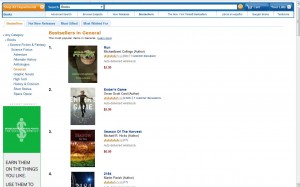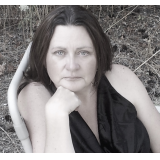BookBuzzr Author Pro subscriber – Michael Hicks writes books in the science fiction & fantasy genre. I was pleased to see Michael Hicks figure in the top 3 books on the Kindle store just behind Ender’s Game which is one of my all-time favourite books.
So, it is with great pleasure and pride, that we present to you an interview with author Michael Hicks.
Michael, would you tell us a little about yourself?
Sure! If we rewind back to the beginning, I was born in 1963, and as a kid was glued to the tube watching the Apollo moon missions, the original Star Trek, and all the outrageous science fiction and war movies I could sneak in when my parents weren’t looking. When I wasn’t doing that or getting into some sort of mischief, I could usually be found with my nose stuck in a book. I grew up in Phoenix, Arizona, but then had to move back to the east coast in search of a job back in the mid-1980s after doing a brief bit of service in the U.S. Army during the Cold War. I met my gorgeous and totally awesome wife out here, and we and my two stepsons (who are fantastic kids) have been together for almost ten years now. And we all are the humble servants of our two Siberian cats, Sasha and his little sister, Nina. They own the place. Just ask them.
Your profile photo on Amazon, Freado and Facebook features you in pilot gear. What’s the story behind this photo?
I’ve always loved planes, and when I was young I had the great good fortune of my parents paying for flying lessons (I even soloed a few times). I couldn’t afford to keep doing it at the time, but I never lost my love of airplanes and flying. My wife’s cousin, who’s also totally awesome, owns a Piper Cub, and she took me flying when we visited her a couple years ago. She was in the front seat of the plane and I was in the back, and she took this shot with her digital camera, shooting over her shoulder. It’s just too bad we don’t live closer – I’d love to go flying more often!
What is the story behind your book – Season of the Harvest?
Season Of The Harvest has its roots in the quest we began a couple years ago to improve our health. I had just had a routine blood test (long overdue: who likes to go see the doctor, right?), and I knew it was bad when the first thing the doctor said was, “I’ve never seen cholesterol numbers this high in a living person…”
So, because I really didn’t feel like dying any time soon, my wife and I began working out regularly and cleaned up our eating, which fixed the cholesterol problem and also helped both of us ditch a lot of unwanted pounds.
In the course of that journey, we learned a lot about the food we eat, and found out a lot about genetically engineered foods, which are also commonly known as genetically modified organisms, or GMOs. I’d known about them, but had no idea both how pervasive they are in non-organic food products, and that we as consumers have been stripped of the right to know if we’re putting these foods into ourselves and, more importantly, our kids. Soy, corn, wheat, rice, and most of the other vegetables and grains that we depend on have genetically engineered varieties, and if you’re not eating certified organic foods, chances are you’re munching on GMOs. Most people who even wonder about GMO foods at all think it’s the same thing as what people have been doing for ages, cross-pollinating plants to get new varieties.
But I doubt anyone’s used that process to create strains of cotton, as an example of an industrial crop, that have been modified with genes from a strain of a rather nasty bacterium so the plant secretes toxins to ward off insects. But I’m sure that the rapid rise of food allergies, toxic reactions to food, and cancer of every variety over the last fifteen to twenty years (which roughly coincides with the widespread introduction of GMOs into our food chain) has nothing to do with GMOs. Why am I sure? Because the GMO industry and the government tell us so. Oh, and did you know that the people who provide the proof to the government that these foods are safe are the companies that produce them?
It’s an industry that rivals the pharmaceutical industry for both profit and lobbying power, and – believe what you like – they essentially “own” the Food and Drug Administration and the U.S. Department of Agriculture, with senior industry officials moving through what’s been termed a revolving door between the industry and government, where they occupy key positions that have a tremendous amount of influence to further the GMO cause.
Anyway, all that (and a lot more – it’s really a fascinating topic!) was sort of percolating around in my head when the idea for Season Of The Harvest sort of popped out. I can remember the exact moment that it happened: my wife and I were talking about GMOs and how crazy the situation was, way beyond what we’d normally expect for run of the mill corporate greed, when I thought, “What if humans aren’t really behind this at all?”
Are there audio versions of your book available? Do you have plans for this?
I would love to have audio book versions of all of my titles, but I don’t have any specific plans for it right now. I can’t afford to have them recorded (yet, at least), and I just don’t have time to do it myself at the moment. So right now this idea is sitting on the “future projects” shelf.
It seems like this would make a nail-biting Hollywood movie. Do you have any such plans?
I would LOVE to see this book made into a movie! I have to confess to a tiny amount of bias here, but I think in the hands of a good producer it would be totally awesome. I’d also like to see the books of the In Her Name series made into movies: I think those would actually be even better. James Cameron, where are you?
What about foreign rights? Any plans to translate the book into other languages?
I don’t have any specific plans for that at the moment, but if the opportunity presents itself, I would certainly love to have this and my other books translated for non-English speakers.
Coming to pricing of books on Amazon … what is your philosophy of book pricing? Most authors seem to price at $.99 for the digital version and less than $10 for the paperback while you have a rather wide range of prices for your books. For example, your book – In Her Name – has a Kindle edition price of $2.99 and a paperback price of $19.79!
Ah, the joys and conundrums of book pricing! I think this is something that every author struggles with, trying to find the pricing “sweet spot” that’s going to attract as many readers as possible and hopefully bring in good royalties.
$0.99 works for many authors, and it’s been working well for Season Of The Harvest, but that’s not to say that it’s always going to be priced at that, or that $0.99 is really the best price point for it (or my other books) at any given time. That price tends to sell more books, although not always: I’ve had one of the In Her Name novels priced at $0.99 for a long time, but its sales were dismal until Season Of The Harvest exposed readers to my other work.
Also, you have to keep in mind the difference in royalties at the different price points. At $0.99, an author will make $0.35 per sale from Amazon, but starting at $2.99, the author takes home $2.09. So, you have to sell six times as many books at $0.99 as you do at $2.99 to make the same amount in royalties. If you’re moving a lot of books, you can price at $0.99 and still make some moolah, but if you’re only selling a few, pricing your book at $2.99 or higher may actually be the smarter move. It’s really a call each author has to make, and it can vary for any given situation.
As far as In Her Name (the omnibus edition) goes, that’s a comletely different animal than Season Of The Harvest! The omnibus contains the full text of the first three books in the series: In Her Name: Empire, Confederation, and Final Battle. Each of those standalone novels is currently priced at $0.99 for ebooks, wth the omnibus priced, as you noted, at $2.99. I have to point out here that I dropped the prices after Season Of The Harvest started taking off, because with the increased sales volume, it made sense to me to do so in order to enhance the price appeal to more readers. However, for most of the time since it was published in 2008, the In Her Name omnibus ebook was at $7.99. Why? Because I had tried various price points, both lower and higher, and the one where I seemed to sell the most was there. Go figure.
The paperback, however, is priced where it is simply because it’s so big: the omnibus is 325,000 words and comes to just shy of 700 pages in 6” by 9” format, and it weighs a full two pounds! You could use it as a lethal weapon in self-defense if you needed to, just knock someone senseless with the thing. And that, of course, costs a considerable amount just to print, plus the cut of the retail price (25% in this case) that goes to Amazon, Barnes &Noble, and other retailers. Besides, to my way of thinking (again, not that I’m biased!), paying around $20 for a book that’s going to keep you entertained for many hours is a bargain, and is a lot cheaper than buying each novel separately. Compare that to getting tickets to the movies, where you’re paying around $10 for a couple hours of entertainment. And you can’t watch the movie again without paying more, but you can reread the book as often as you like!
Your books seem to attract plenty of reviews on Amazon. How can authors get more of their readers to write reviews for their books?
If I knew the magic secret to this, I’d be happy to share it! This is something that I know many authors struggle with, and reader reviews are critical, both because it’s a form of word of mouth “advertising” and they lend credibility to a book for other potential readers.
One thing I’ve done that seems to have worked well is glaringly obvious, but often overlooked: ask for what you want. Kindly, nicely, politely, gently ask your readers if they would consider writing a reader review wherever they bought the book, and if they’d please let their friends know about if they enjoyed it. I even have a little review request tucked away at the end of some of my books, and at some point will go back in and add it to the others when I get a chance. This is especially the case when a reader comes out of the blue and says, “Hey, I really liked your book!” Tell them, “Wow, thanks! Glad you enjoyed it! And please do consider writing a reader review – those are gold for us starving authors!”
Almost every popular book out there receives a few negative reviews. How should an author emotionally cope with such negative reviews?
Negative reviews are going to happen, and the more popular the book, the more (in terms of numbers, if not overall percentage of reviews) it will receive. Look at Saving Rachel, by John Locke, which is one of his titles in the top 10 of the Kindle store: it has 355 reviews right now. Tossing out the 3-star reviews, which are generally thought of as “it was okay/so-so”, that leaves 206 “great” (4- and 5-star) versus 114 “bad” (1- and 2-star) reviews. So for every two great reviews the book has gotten on Amazon, it’s gotten a bad one. But do you think John Locke is crying over those reviews? Sure he is: all the way to the bank, because according to what I read on Joe Konrath’s blog recently, Locke sold roughly half a million copies of his books in the first quarter of this year. Power to him!
My point is that bad reviews are part of the process, and you can’t take them personally. Some people are going to like what you’ve written, some people aren’t. It’s okay either way. But if you hit the publish button expecting everyone to love your book, you’ve got a first class ticket for a one-way ride on the Train Of Disappointment.
The one thing an author should never, ever do is lash out at a reader or reviewer. There was a startling example of this recently on a reviewer’s blog, where the author of the book that was reviewed totally lost her head. The resulting torrent of commentary on the blog, which also went viral on Twitter and probably reached an audience of thousands, if not tens of thousands, destroyed the author’s credibility forever. My policy is that I don’t even engage with readers or reviewers on negative topics, and I usually steer clear even of positive ones, unless someone asks a question of me. Let the readers and reviewers have their discussions: if they want you to get involved, they’ll let you know.
Instead of feeling hurt or angry, look closely at those negative reviews, because many of them, particularly if the person takes some time to really explain what they didn’t like, can provide valuable nuggets of information that you can use to improve your writing. As one example, a reader of one of my In Her Name books had a pet peeve about my use of dashes. No one else has ever commented on it, and my editors (one of whom, in particular, is extremely persnickety) let them by, but it’s something that I kept in mind for the next book.
And for those readers or reviewers who zap authors for really silly things (my favorite is hammering on a book because of the price set by the publisher, and then the reader didn’t even buy it)…just ignore them. When other readers see those sorts of reviews, most are savvy enough to realize that the person who wrote them was just being unkind. So just forget them and move on.
Do you market your book on Amazon in the discussion forums? Does this work?
I did once upon a time a couple years back, but like a number of other authors I was the victim of the volatility that seems to be a trademark of those forums, as they’re not really moderated and are often a haven for trolls. And, to be fair, some authors come into those and othe forums like bulls in a china shop, and people generally don’t appreciate it, and rightly so. But after being tarred and feathered by both some fellow authors and readers for making what I had thought was a constructive suggestion, I decided my time would be better spent elsewhere.
How effective is Twitter when it comes to helping you find new readers for your books?
I don’t have statistics to back it up, but I believe that Twitter is driving about ninety percent of my sales now. It took me quite a while to figure out what worked for me, but at this point I get a lot of feedback and interaction with both readers and other authors. More important, there is a growing group of authors (as well as individual readers) that mutually promote by retweeting information about books by other authors. This is a tremendous form of leverage, because not only are you able to directly tweet to your fans, but you reach the fans of those other authors, as well.
“Hey, but isn’t that competition?” you may ask. I don’t believe so: I believe it’s a form of coalition. For example, one of my fans may have already read all of my books, or maybe he or she has just read one, but likes it and plans to read more. What harm is it going to do for me to let them know about books they might enjoy from fellow authors? As the saying goes, a rising tide floats all boats.
But the bottom line is, for me Twitter has been a godsend. My books wouldn’t have hit the charts without it.
You also have a Facebook fan page. What do you do on this page in order to engage with your fans?
This is a work in progress for me, because unlike Twitter, I have yet to come up with a winning strategy for my fan page. I think I have part of the formula figured out, in that my personal page became so popular (up to 5,000 friends before I started weaning folks over to the fan page) because I’m such a nut about things that I post. So I started doing that on my fan page, just trying to be more “me” instead of just plugging my books all the time. The following there is growing, but I’ve got a long way to go yet before it’s as effective as I’d like it to be: there’s a lot I have yet to learn.
What would be your advice to a fiction author who wants to market his or her book?
The first thing I’d say is that if you want your book to sell, you have to promote it. I’ve spent most of my very limited time concentrating on writing – which is in itself a valuable promotional tool after you’ve established a following, as your existing readers will want more – until Season Of The Harvest was ready. Then I came to the conclusion that it didn’t matter how good a book was: if no one knew about it, it wasn’t going to sell well. And the first voice potential readers will likely hear will be the author’s.
So, make sure to set aside some time in your day for promotional activities. Beyond that, you have to experiment to find what works for you. There’s a lot of advice and information on promoting books, so start educating yourself (side note: if you want to go anywhere with publishing or anything else, you should spend at least a small part of your day working on self-improvement!) and put what you learn into action. While Twitter, Facebook, and blogs may or may not be “your” thing, make sure you have a web presence, as you simply can’t get by anymore without one.
One of the most important things, though, is don’t be obnoxious in your promotional activities. Authors have largely been banned from most forums or must post under very stringent rules because of thoughtless spamming by inconsiderate authors. The same is true on Twitter or any other medium: sure, let people know that you’re a writer and don’t be ashamed to tell them about your book, but don’t send out fifty tweets every hour begging people to buy it, and focus a good chunk of your time on them, not just you!
Do your online activities take away time from your writing? How do you normally apportion your time between writing and engaging with your readers?
It absolutely takes time away from writing, but as I mentioned, you’ve got to make time to do both. One thing I’ve worked hard on over the last six months is improving my time management. I figure that on an optimal weekday, where we don’t have any additional running around (like taking the boys to sports, etc.), I have a maximum of four hours that isn’t taken up by sleep, work, or other “must do” activities. I’ve been gradually disciplining myself to get in a minimum of an hour of writing every night, which for me usually equates to 500 to 1,000 words, and at least an hour of on-line activity, most of which is spent on Twitter. If I have more time, I do more, and if I really get into a writing spree, I’ll put off the on-line stuff to appease my muse. On the weekend I can sometimes get in more, depending on what’s going on.
You are also giving away your book – In Her Name: Empire – for free digital download on your website? What is the reason for this? What kind of results have you seen?
The Kindle and other ebook readers are great to get a feel for a particular book through the sampling feature (as is Amazon’s Look Inside feature for print books), but I wanted to give prospective readers something really meaty. With a total of six books (seven, if you count the omnibus) published now, I thought it was worth a try giving one of them away as sort of a super-sample of my work. So instead of being able to sample just ten percent or so of a particular book, why not give them a whole novel to really judge my storytelling? If they enjoy Empire, they’re much more likely to buy the other books in the series, and are also much more likely to buy, or at least seriously look at, any other books I write, because they’ll know what to expect.
The results are hard to guage, as there aren’t any handy metrics, but I know there have been at least some folks who have read the free copy of In Her Name: Empire who went on to buy my other books because of it. And how can anyone go wrong with free?
As with everything else, though, this is a personal decision for everyone. There’s no right answer, particularly for authors who have just published their first book. The last thing you want to do after investing all that effor is to just give it away. But one option is to offer a juicy on-line sample (in a PDF file, perhaps) that’s more than ten percent of the book, maybe ending on a cliffhanger in the story so the reader will want to buy the book and see what happens. Experiment and see what works for you!






